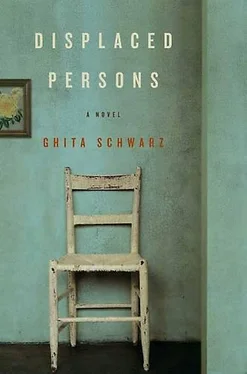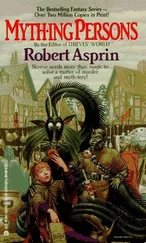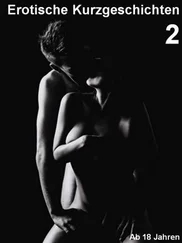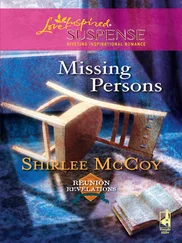A tall girl, long hair, came over to her bench. Tsipora’s oldest granddaughter, her eyes small from crying.
“Oh, Fela,” she said. “You’re not coming to the cemetery?”
“Of course I am, sweetheart, neshumele , of course I am!” Fela was surprised. “I was just sitting, waiting, you know, for Pavel to arrange our ride.”
“Why don’t you come with us? We have room for the two of you. It’s just my mother and sister.”
Fela looked over at Pavel, pacing with Fishl. Why couldn’t she go alone? He could drive as he wanted, and she could go in comfort. Why not?
“Sweetheart, have you checked with your mother? Maybe she doesn’t want someone outside the family.”
“She sent me over. You’re not outside.”
“Well,” said Fela, neck straightening. “Well, maybe I will.” She pushed herself up with her hand on the wall of the building, leaned on the granddaughter’s arm. “Pavel!” she called. “Pavel! I go with Stacy! Okay?”
“What?” Pavel turned too quickly, wobbling on his good leg. He began calling something in Yiddish. But Fela wouldn’t hear it.
“I see you there!” She moved her legs toward the limousine that held the family, then twisted her neck around, seeing Pavel unmoving, stunned. In a moment he would start to fume. Fela would pay later, with his silences and stomping. But at this moment he looked lonely, standing with no one while Fishl shuffled across the street to the garage and the cars began their journey across the river to New Jersey.
Sad, thought Fela. But he wouldn’t be left here, forsaken while everyone traveled to the burial. He would arrive; they would be there together. He was her partner, at least for this life. They wouldn’t abandon each other for long.
They couldn’t. She waved. Pavel waved back. She waved again. Then-and why not?-she blew him a kiss.
October 2000
P AVEL AND FELA ARRIVED home from the unveiling in time for their Sunday family meal. Larry had driven them in the rain to the ceremony at the new gravestone, the gravestone belonging to Henry Budnik, who, just before his death the year before at the age of eighty-three, had made Pavel promise to watch over the stonecutting. Budnik’s wife had died just before him, and he didn’t trust his children.
Pavel was forced to lean halfway on his wife and halfway on Larry, who helped him-a little too rough, Pavel thought-move his stiff leg out of the car. But once at the door of the apartment, Pavel pulled himself away. He could walk easier inside.
Helen was there already, waiting for them in the kitchen. She was alone, and she had brought rye bread, and a bit of smoked fish, and bagels for Larry, and dietetic cookies for Fela, who had developed high sugar. Everything was prepared.
Helen was sipping coffee at the table, reading the paper. “Hi, guys,” she said.
“Oh, Helen,” said Pavel. He grabbed her around the shoulders, pressed her head to his. “But where is my littlest yingele ?”
“Jonathan took him to a birthday party. His first one! And Nathan is at a playdate.”
“So thank God you are here. At least you are here.” He pressed his arms around her shoulders again.
“Dad,” said Helen. “Don’t be so shocked. Wasn’t I here on Thursday?” Fela pushed out a big sigh, but Pavel didn’t care. He was lucky to be able to see his daughter, that was what. He was lucky to have his family together, all in one place.
“All in one place,” he announced. “See how good it is?” He looked at Larry significantly, but Larry had turned, on his way to put the umbrellas in the bathtub to dry.
“Is everything all right?” Helen looked at Fela.
“He didn’t sleep last night.” Fela sighed. “And because he didn’t, I didn’t. I heard him from the next room!” Pavel could see her eyeing the white table, making sure there were no smudges from Helen’s newspaper. “Maybe I get a sponge,” said Fela.
“Ma,” said Larry, coming back in, “sit. Just sit. Sit.”
“Why didn’t you sleep, Dad?”
“He had a nightmare,” said Fela, to Larry and to Helen. “He was mumbling, moaning.”
“Not a nightmare,” muttered Pavel. “A bad dream.” He gave his wife a glare. Why should the children worry? He had dreamed about the gravestone for Budnik, and then about the gravestone for his own mother, which wasn’t in the right place at all. It bothered him, the place of the gravestone for his mother. He rubbed his lips with a cube of sugar; he didn’t like it mixed with his coffee.
“It was my mother,” said Pavel. In the dream, the gravestone of his mother was in the wrong place. But how could it be? They had made sure, Pavel and his cousin Mayer, and with Larry as a witness, that the thing was in the right place. There had been a map and there had been a guide when they went back to Poland, just before the fall of the Berlin Wall, to visit the graveyard where Pavel’s mother had been buried several years before the start of the war. She had died in childbirth for their youngest brother, a premature death but a normal death, a death that had come with a funeral, and prayers, and a stone to be unveiled a year after the burial.
“It was my mother,” Pavel repeated, but how could he explain? He couldn’t, not to his son, who had observed the restoration of the gravestone with his doctor’s detachment, and not to his wife, that was too painful for both of them, and not even to his daughter, who usually knew how to listen. She understood, Pavel thought, what he was saying-he believed that she did-though sometimes he doubted even this. She never said too much, just asked a question or two. But could she understand? No one could. And part of him did not want her to understand. They had made a pact, Fela and he, when the children were born, not to let them be affected by the whole thing, all the suffering, and possibly they had done a satisfactory job of it! One had to be careful with one’s children, not to let it affect them. But it was true, Pavel was lonely sometimes to talk.
“Was it the gravestone?” Helen asked. “Because, you know, I read an article. Those maps they use in the old graveyards are restored from the originals. They’re very accurate.”
How did she know what worried him? Had he mentioned it before? But surely this was the first time he had dreamed it. Wasn’t it? Perhaps not. She tried to reassure him, his daughter, in the same way he always had tried with her: by lying. An article here, a television report there. But it was real, his fear.
“No, no,” said Pavel, unable to hide the swell of hurt in his voice. “It was my mother. It wasn’t the stone, it was the graveyard itself.”
Fela gave a big sigh, again.
“What?” said Pavel. “What did I do?”
“Larry saw the graveyard himself,” said Fela. “Tell him, Larry. Wasn’t everything right?”
“It was hard to tell,” Larry said, his eyes focused on the chair straight between Pavel and Fela.
“Aha,” said Pavel, looking pointedly at his wife. Even his son agreed with him, and that was so rare an occurrence that Fela would have to take notice.
But Larry continued. “It was hard to tell, Dad. It really was. But remember? The men gave us a map. They showed it to us. They researched it very carefully. They wouldn’t want to make anything up. It’s their graveyard too.”
Pavel said nothing.
“It was a beautiful stone,” Larry went on. “The new one, I mean. The one you got. Now it’s easy to find.” His son spoke quickly, a rush, always in a rush. But it was true, the stone was beautiful. Plain and perfectly rounded and white. It had stood out from the others in the graveyard, crushed gray stones bent onto one another, stones that had been vandalized by the Germans and the Poles. The remnants of Pavel’s mother’s stone were still there. Others had been taken recently by the Krakow heritage society to make a memorial wall. Pavel hadn’t liked that. A friend of Pavel’s came from a town where soon after the invasion the Jews had been forced to remove the stones from the cemetery with their own hands, then pave them into the road to be stepped on by soldiers and towns people. Was it so different, fifty years later, to make a broken graveyard into a wall for the memory of it? Of course it was different. Memorials were important. But still, the wall had made Pavel’s stomach shrink and fold over when he saw it. He was glad his mother’s original stone, even in its broken and dilapidated condition, had remained on the earth behind the abandoned synagogue. A synagogue that was now a museum, for people to look, not to gather or pray. Not a real synagogue any longer, but still a real graveyard. A graveyard of graves.
Читать дальше











